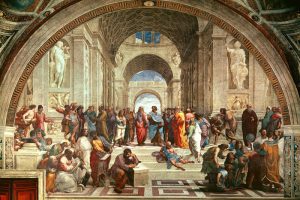Al-Farabi. The dialogue of East and West
 |
| Arabic-language philosophy was greatly influenced by ancient Greek philosophy. Al-Farabi, according to Ibn Khallikan, could say: “If I had lived in the time of Aristotle, I would have been the best among his disciples.” Al-Farabi created an entire encyclopedic system, similar to Aristotelian teachings. He wrote about 160 treatises covering all branches of knowledge known at that time: politics, psychology, ethics, natural sciences, aesthetics, logic, and of course philosophy. Unfortunately, not all works have been preserved, but the main works have survived and are stored in the best libraries of the world: in Cairo, Istanbul, Beirut, London, Berlin, Paris, Bratislava, Moscow and St. Petersburg.
Arab thinkers Al-Biruni, Ibn Sina, Ibn Rushd, Ibn Baja, Ibn Tufayil and many others considered themselves disciples of al-Farabi. Ibn Sina said that he understood the “Metaphysics” of Aristotle only through the comments of al-Farabi. Ibn Sina’s medical works were highly valued in Europe throughout the Middle Ages. Ibn Rushd was known in Europe under the name of Averroes. Ibn-Rushd developed the idea of al-Farabi about the superiority of philosophy over religion, reason over revelation, laying the foundations of the doctrine of the duality of truth. Ibn-Baja was also influenced by the philosophy of al-Farabi, in his work “On the lifestyle of a hermit” he writes about the important role of knowledge in achieving ethical excellence. Ibn-Tufeyl in “The novel of Haya, the son of Yakzan,” develops the thought of al-Farabi about the perfection of the philosophical way of knowing the truth. Speaking about the influence of al-Farbi on European philosophy, first of all we should mention the Jewish philosopher, the theologian Maimonides, whose work “Guide to the Lost” contains the ideas of al-Farabi. Through Maimonides, a thread is traced in the history of philosophy leading from al-Farabi to Spinoza, D. Skot, R. Bacon. The English monk and philosopher R. Bacon, fluent in Arabic, studied the works of al-Farabi in the scripts. During the Renaissance, Europe regained the “treasures” of classical ancient Greek philosophy and the al-Farabi’s merit in this is very significant. Al-Farabi is one of the key figures in the history of intellectual thought, that influenced the development of world civilization. His legacy had contributed to the establishment of dialogue and the rapprochement of cultures of East and West. The theme of dialogue between East and West remains relevant to this day. A dialogue strategy seems to be the only right one to strengthen solidarity and mutual understanding in the modern world. |




